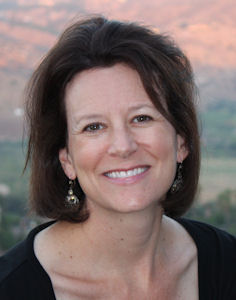 Longtime newsletter subscribers and those who follow me elsewhere on the Internet may recall my admiration for author Midge Raymond, whose work I encountered years ago in literary magazines and whom I had the happy opportunity to meet when we were both still residents of the Boston area. We have stayed in touch over the years, and back in June 2012, Midge answered some questions about her then-latest book, EVERYDAY WRITING: TIPS AND PROMPTS TO FIT YOUR REGULARLY SCHEDULED LIFE, for newsletter readers.
Longtime newsletter subscribers and those who follow me elsewhere on the Internet may recall my admiration for author Midge Raymond, whose work I encountered years ago in literary magazines and whom I had the happy opportunity to meet when we were both still residents of the Boston area. We have stayed in touch over the years, and back in June 2012, Midge answered some questions about her then-latest book, EVERYDAY WRITING: TIPS AND PROMPTS TO FIT YOUR REGULARLY SCHEDULED LIFE, for newsletter readers.
Now, Midge has a new book: EVERYDAY BOOK MARKETING: PROMOTION IDEAS TO FIT YOUR REGULARLY SCHEDULED LIFE. Since I love how the two books dovetail with our newsletter’s focus on the craft AND business of writing, and since I was lucky enough to receive a complimentary advance review copy and know how useful it is, I invited Midge to talk about EVERYDAY BOOK MARKETING with us as well.
And just as a reminder: Midge’s short-story collection FORGETTING ENGLISH received the Spokane Prize for Short Fiction. Originally published by Eastern Washington University Press, the collection has been released in an expanded edition by Press 53. With her husband, John Yunker, Midge is co-founder and editor of Ashland Creek Press.
Please welcome (back!) Midge Raymond!
ERIKA DREIFUS (ED): Please tell us how EVERYDAY BOOK MARKETING came into the world.
MIDGE RAYMOND (MR): EVERYDAY BOOK MARKETING came about a few years after my story collection, FORGETTING ENGLISH, was published. By the time FORGETTING ENGLISH was released, its university press was about to close, and I didn’t have any marketing help. So I quickly had to become my own publicist and sales force. I learned a lot and also realized that the vast majority of authors, whether self-published, small-press published, or published by one of the Big Five, have to do most of their own marketing. So I began to work on this book and decided to follow a similar format to EVERYDAY WRITING – that is, helping writers find ways to fit book marketing into their busy lives.
ED: It’s surely too early to evaluate your book-promotion efforts for this book, but let’s consider the book that preceded it: EVERYDAY WRITING. What was the single most successful thing you did to promote that book?
MR: I’m not sure that any one thing was more successful than another. I think doing a variety of things is what helps most in getting the word out. I did workshops based around the ideas in the book – how to fit writing into an already full life – and these classes resonated with a lot of busy writers. I reached out to bloggers and reviewers and fellow writers, and the word of mouth from their reviews and my own guest posts helped a lot. A writer friend of mine, who has been a consistently published author for more than 30 years, tells me that she has found that word of mouth is the one constant in terms of what sells books; what has changed over the years is how word of mouth happens – for example, through book clubs or social media rather than newspaper reviews. So if writers think about the audience for their books – and it’s different for every book – they can try fun and innovative ways to reach this audience.
ED: Which aspect of book promotion has surprised you the most?
MR: As an author, the most surprising thing was the amount of work involved. Having worked in publishing, I knew that I’d have a lot of work to do, but I had no idea that I could promote my book around the clock and it still wouldn’t be enough. This is one of the reasons I wrote EVERYDAY BOOK MARKETING, to help writers fit in promotion without feeling as if they’re going crazy, and to find the right balance to keep it manageable.
I also wrote the book in part with our Ashland Creek Press authors in mind, all of whom are very passionate about their books but may not be experienced in marketing or publishing. Even as someone who’d spent years in publishing before becoming an author, I had so much to learn, and I wanted to help others on their journeys in whatever ways I could. Writers often think that publishing their books is the last step in the process, when in fact it’s actually the first step!
ED: What is the biggest marketing challenge you’ve faced?
MR: My biggest marketing challenge when FORGETTING ENGLISH came out was how to get it reviewed; my publisher hadn’t sent it out, and by the time I learned this, it was too late to get reviews from the trade magazines or major media. Yet I sent review copies out anyway – to media as well as book bloggers, and had a bit of good luck. It’s very humbling for an author to do this herself, but I learned that if you want your book to get any attention at all, you have to be willing to do whatever needs doing.
ED: Amazon’s KDP Select program comes up several times in EVERYDAY BOOK MARKETING, and more than one of your interviewees cite it as a program worth pursuing. What’s your take on the KDP Select program and its advantages (and disadvantages) for authors?
MR: For a limited time, I sold FORGETTING ENGLISH via Amazon’s KDP Select program, and it did indeed help me reach new readers, as well as give me a boost in my ranking, which is always nice. However, when you choose KDP Select, you have to make the book unavailable in all other digital formats, which some authors are comfortable doing, while others prefer to keep their books available via Nook, Kobo, and Apple as well as Kindle. It’s all simply a matter of preference and what the author hopes to achieve. And I think it’s also a matter of genre – certain genres, such as mystery and romance, sell very well digitally, and KDP Select can be an excellent option for self-published authors in such genres.
ED: Any parting advice for practicing writers on the practice of book marketing?
 MR: It’s so important for authors to realize that book marketing can be as essential as writing, especially if you’re not traditionally published by a house that gives you a lot of marketing support. Authors who want readers need to be prepared to go find them, and fortunately there are so many ways in which to do that. The best advice I can offer is to know your audience and be open to anything – whatever it may take to reach new readers is worth doing. And I think authors need to be willing to stretch a bit beyond their comfort levels as well – it’s not easy, but it can make a big difference, and it’s also inspiring to do things that may seem difficult at first but in the end are usually a lot of fun. And seek out fellow authors. It’s wonderful to have a support system of other writers so you can share ideas, commiserate, and support one another’s work.
MR: It’s so important for authors to realize that book marketing can be as essential as writing, especially if you’re not traditionally published by a house that gives you a lot of marketing support. Authors who want readers need to be prepared to go find them, and fortunately there are so many ways in which to do that. The best advice I can offer is to know your audience and be open to anything – whatever it may take to reach new readers is worth doing. And I think authors need to be willing to stretch a bit beyond their comfort levels as well – it’s not easy, but it can make a big difference, and it’s also inspiring to do things that may seem difficult at first but in the end are usually a lot of fun. And seek out fellow authors. It’s wonderful to have a support system of other writers so you can share ideas, commiserate, and support one another’s work.
ED: Thank you so much, Midge.
NB: As mentioned above, the editor’s questions were developed after reading a complimentary copy of EVERYDAY BOOK MARKETING. To learn more about the book, please visit http://www.ashlandcreekpress.com/books/everydaybookmarketing.html.
A version of this interview appeared in the September 2013 issue of The Practicing Writer.